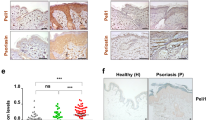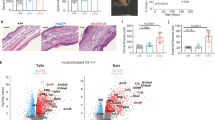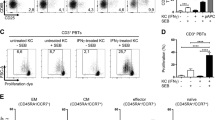Abstract
T cells are crucial mediators of the skin damage in psoriasis. We here show that interleukin-21 (IL-21), a T cell–derived cytokine, is highly expressed in the skin of individuals with psoriasis, stimulates human keratinocytes to proliferate and causes epidermal hyperplasia when injected intradermally into mice. In the human psoriasis xenograft mouse model, blockade of IL-21 activity resolves inflammation and reduces keratinocyte proliferation. Blocking IL-21 may represent a new therapeutic strategy in psoriasis.
This is a preview of subscription content, access via your institution
Access options
Subscribe to this journal
Receive 12 print issues and online access
$209.00 per year
only $17.42 per issue
Buy this article
- Purchase on Springer Link
- Instant access to full article PDF
Prices may be subject to local taxes which are calculated during checkout


Similar content being viewed by others
References
Lowes, M.A., Bowcock, A.M. & Krueger, J.G. Nature 445, 866–873 (2007).
Monteleone, G., Pallone, F. & MacDonald, T.T. Trends Immunol. 29, 290–294 (2008).
Liu, Y. et al. PLoS Genet. 4, e1000041 (2008).
Takahashi, H. et al. J. Dermatol. Sci. 30, 94–99 (2002).
Hobbs, R.M., Silva-Vargas, V., Groves, R. & Watt, F.M. J. Invest. Dermatol. 123, 503–515 (2004).
Zheng, Y. et al. Nature 445, 648–651 (2007).
Ma, H.L. et al. J. Clin. Invest. 118, 597–607 (2008).
Wrone-Smith, T. & Nickoloff, B.J. J. Clin. Invest. 98, 1878–1887 (1996).
Caprioli, F. et al. J. Immunol. 180, 1800–1807 (2008).
Acknowledgements
This work received support from the Fondazione Umberto di Mario and Giuliani SpA, Milan, Italy. It is dedicated to the memory of A. Ribuffo, the Master of the Roman University School of Dermatology.
Author information
Authors and Affiliations
Contributions
R.C. performed cultures with keratinocytes, analyzed cytokine expression and conducted the in vivo experiments; M.L.G. performed the immunohistochemical studies and cultures of primary keratinocytes; M.S., M.E., C.S., M.S., E.B. and V.P. performed flow cytometry staining and western blotting and isolated blood mononuclear cells; E.C., A.M. and L.D. collected skin biopsies; S.C., F.P., T.T.M. and A.C. contributed to supervising parts of the project and writing the paper. G.M. designed research, supervised the project and helped write the manuscript.
Corresponding author
Ethics declarations
Competing interests
G.M. has filed a patent entitled “Interleukin-21 (IL-21) binding proteins and methods of making and using same” (European Patent Application No. 08425294.9).
Supplementary information
Supplementary Text and Figures
Supplementary Methods and Supplementary Figs. 1–4 (PDF 394 kb)
Rights and permissions
About this article
Cite this article
Caruso, R., Botti, E., Sarra, M. et al. Involvement of interleukin-21 in the epidermal hyperplasia of psoriasis. Nat Med 15, 1013–1015 (2009). https://doi.org/10.1038/nm.1995
Received:
Accepted:
Published:
Issue Date:
DOI: https://doi.org/10.1038/nm.1995
This article is cited by
-
The Role of Interleukins in the Pathogenesis of Dermatological Immune-Mediated Diseases
Advances in Therapy (2022)
-
Expression of B lymphocyte-induced maturation protein 1 (Blimp-1) in keratinocyte and cytokine signalling drives human Th17 response in psoriasis
Archives of Dermatological Research (2022)
-
Pellino1 promotes chronic inflammatory skin disease via keratinocyte hyperproliferation and induction of the T helper 17 response
Experimental & Molecular Medicine (2020)
-
IL-21 Enhances the Degradation of Cartilage Through the JAK-STAT Signaling Pathway During Osteonecrosis of Femoral Head Cartilage
Inflammation (2018)
-
IL12/IL23 Inhibition in the Treatment of Psoriatic Arthritis
Current Treatment Options in Rheumatology (2015)



